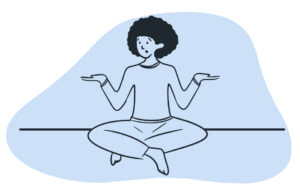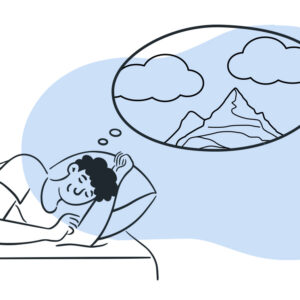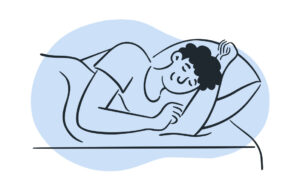17 Tips For How To Sleep On A Plane
Disclosure: By clicking on the product links in this article, Mattress Nerd may receive a commission fee at no cost to you, the reader. Read full disclosure statement.
For many folks, sleeping on a plane is hard to do. And it’s not necessarily the altitude – it’s all the little things, like the stranger to your immediate right or left (or both), the noise, the turbulence, the dry air, and the list goes on.
The good news, though, is that addressing all these little disruptions just takes a little planning. Once you do, it really is possible to snooze 30,000 feet in the air. Here’s our top tips to sleep on a plane.
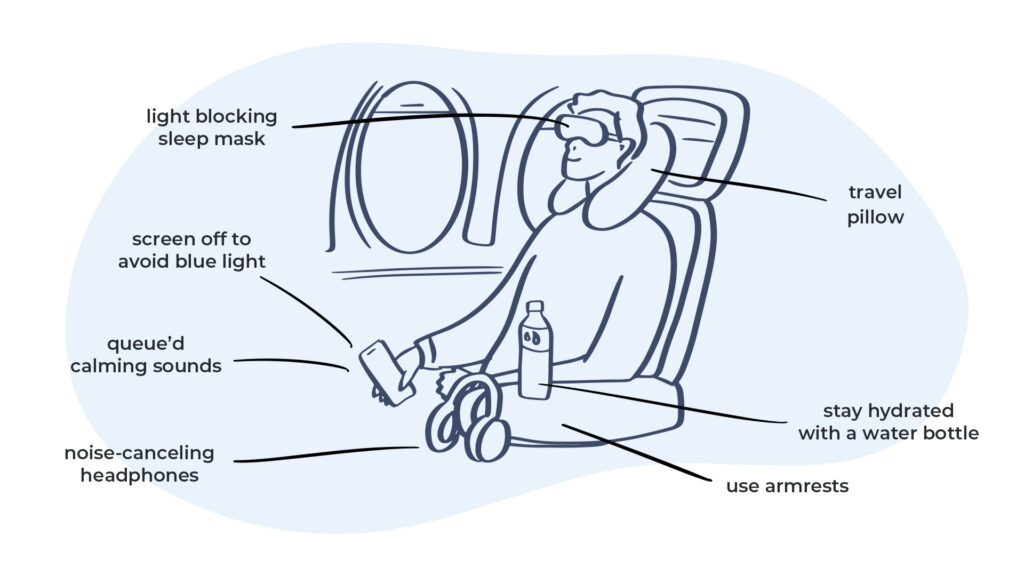
1. Use a Light-Blocking Sleep Mask
Light can make it significantly harder to sleep on a plane, and it can be significant. One study found that exposure to ambient room light shortens melatonin duration by a good 90 minutes. On a plane, the workaround is a good eye mask that fits you nicely to block out as much light as possible.
2. Try Noise-Canceling Headphones
Even when your neighbors are quiet, planes are noisy, about the equivalent of a running vacuum cleaner. That means a pair of high-quality, noise-canceling headphones is worth the investment. In a pinch, earplugs will work, and so will Bluetooth-enabled earbuds that connect to your phone.
3. Pack Travel Pillows
Sleeping upright is next to impossible, but good lumbar support can help make you more comfortable. Try placing a pillow behind your back and pair it with a U-shaped pillow to support your neck. Research suggests this type of neck pillow helps sleepers stay comfortable because it restricts head movement so well.
4. Listen to Calming Sounds
While you’ll want to minimize time on a blue-light emitting device, you can queue it up for calming sounds. Guided meditations, soothing music, sleep stories, or pink noise – rainfall, nature sounds, ocean waves – can all make it easier to fall asleep.
5. Try Aromatherapy
Multiple studies have found aromatherapy effective for better sleep, and lavender essential oil in particular seems to promote slow-wave sleep. Keep a little bottle handy and take a few calming breaths to help you relax and wind down.
6. Avoid Devices
It can be tempting to zone out on your phone, but the blue light can do more harm than good if you’re hoping to fall asleep. A clinical review found that multiple studies found blue light exposure increases tiredness while decreasing sleep quality and duration.
7. Manage your Body Temperature
Temperatures can vary wildly on planes, often during the same flight, so plan accordingly. The best temperature for sleep is between 60 and 67 degrees Fahrenheit. Do your best to get comfortable by dressing in layers and packing a lightweight blanket.
8. Skip the Caffeine
Caffeine is a stimulant, and the general recommendation is to cut yourself off at least 6 hours before you plan to go to bed. Follow the same rule on the plane, which may mean skipping the coffee before you take off.
9. Avoid Alcohol
Alcohol may relax you enough to fall asleep on a plane, but it decreases both deep sleep and REM. That means you’ll wake up feeling groggy, dehydrated, and generally crummy.
10. Hydrate Properly
Staying hydrated is key to combating that dry plane air. Airplane cabins are notoriously low in humidity, and it can dry out your nasal passages and throat, making it harder to sleep comfortably. Sip water throughout your flight, and consider nose drops or ask for hot water so you can breathe in the steam.
11. Eat Appropriately
What you eat – and when you eat it – affects your circadian rhythm. So skipping meals, overeating, or snacking right before sleep can all make it harder to rest comfortably. Pack healthy options, like fruits and nuts, and do your best to eat around the same times you normally do.
12. Stick to Your Usual Bedtime Routine
If your bedtime routine involves a good book or a cup of herbal tea, do your best to replicate it. A bedtime routine, especially when it’s consistent, signals your body that it’s time to wind down. Even on a plane, doing what’s familiar (to the best of your ability) could help you fall asleep.
13. Use the Arm Rests
Sitting upright isn’t the best position for sleep, but work with what you have – the armrests. Using armrests can help relieve pressure in the back, making you more comfortable. And when we’re comfortable, it’s easier to fall asleep.
14. Upgrade Your Seat
If possible, upgrade your seat so you have more room to stretch out. Seats that recline completely are best, but even a little extra legroom and a little distance from your seatmate have physical and psychological benefits.
15. Time the Flight Wisely
Night-time flights can make it easier to fall asleep since they align with your regular sleep schedule. This is a good option for long-haul flights in particular. When you book, choose flights that take off close to your regular bedtime, and opt for direct flights wherever possible to minimize disruptions.
16. Prep Before your Flight
Multiple studies confirm that exercise improves sleep quality, so use it to your advantage. If you’re flying out in the afternoon or evening, tire yourself out beforehand – hit the gym, go for a hike, get your steps in at the airport, whatever you can do. Just don’t miss your flight!
17. Address Stress or Anxiety
If you’re a nervous flier, plan accordingly. Pay extra for a better seat, if you can, and make yourself as comfortable as possible either way. Try meditation, breathing techniques, aromatherapy, and get settled with your headphones and eye mask for a better chance of falling asleep.
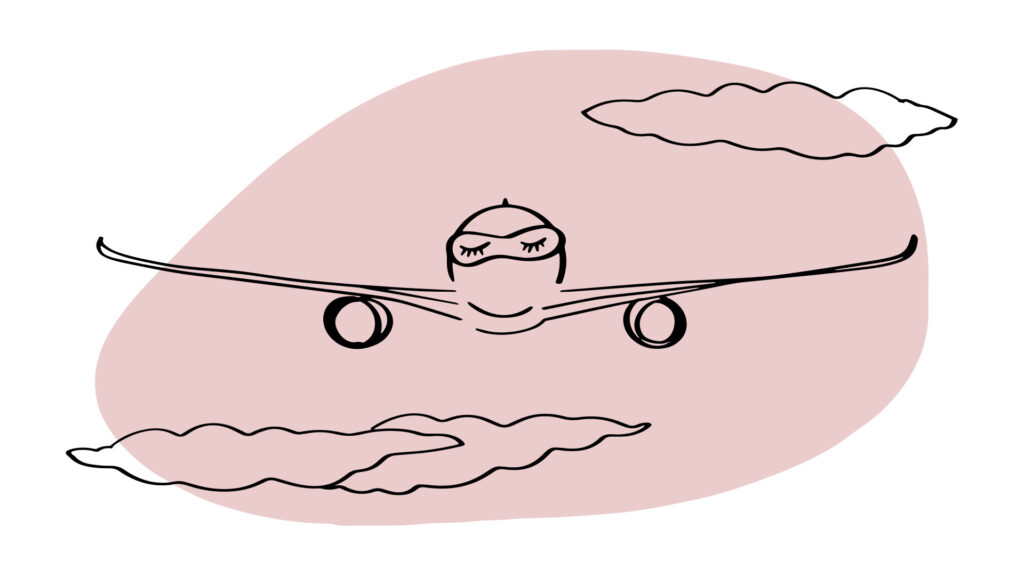
Frequently Asked Questions
Why is it hard to sleep on a plane?
Sleep can be elusive at the best of times, which is why experts recommend things like proper sleep hygiene and setting yourself for night-time success with good habits during the day. On a plane, you have to deal with a lack of privacy, less personal space, turbulence, noise, odors, dry air, and general stress and anxiety. It’s not the best combination for restful sleep!
How do you sleep on a plane with anxiety?
If anxiety makes it impossible to sleep on a plane, consider splurging on an upgraded seat. While the extra legroom will definitely be more comfortable, there’s a mental component that plays a bigger role. It’s just easier to relax when you aren’t in close quarters with a stranger.
If you can’t spring for the considerable upgrade, focus on making yourself comfortable. An eye mask, noise-canceling, and a neck pillow can help distract yourself from your cramped environment by blocking out your current reality.
Is it safe to take sleeping medication on a plane?
It can be tempting to lean on medications so you’re guaranteed to sleep on a flight, but it’s not the best plan. There are potential side effects to sleeping pills, and you’ll need to be really clear about a medication’s expected duration and your flying time.
Some sleeping aids can leave you feeling groggy when you wake up, too.
The Takeaway
Sleeping on a plane doesn’t have to be impossible. In fact, planning your flight and packing accordingly makes it easier than you’d think.
Source List
FDA requires stronger warnings about rare but serious incidents related to certain prescription insomnia medicines. (2019). https://www.fda.gov/news-events/press-announcements/fda-requires-stronger-warnings-about-rare-serious-incidents-related-certain-prescription-insomnia
Reviewing alcohol’s effects on normal sleep. (2013). https://www.sciencedaily.com/releases/2013/01/130122162236.htm
Andersson BJ, et al. (1975). The sitting posture: an electromyographic and discometric study. https://pubmed.ncbi.nlm.nih.gov/1113963/
Bouwens JMA, et al. (2017). Expected versus experienced neck comfort. https://onlinelibrary.wiley.com/doi/abs/10.1002/hfm.20721
Capezuti E, et al. (2022). Systematic review: auditory stimulation and sleep. https://pubmed.ncbi.nlm.nih.gov/34964434/
Gooley J, et al. (2011). Exposure to room light before bedtime suppresses melatonin onset and shortens melatonin duration in humans. https://www.ncbi.nlm.nih.gov/pmc/articles/PMC3047226/#
Ko LW, et al. (2021). A pilot study on essential oil aroma stimulation for enhancing slow-wave EEG in sleeping brain. https://www.nature.com/articles/s41598-020-80171-x
